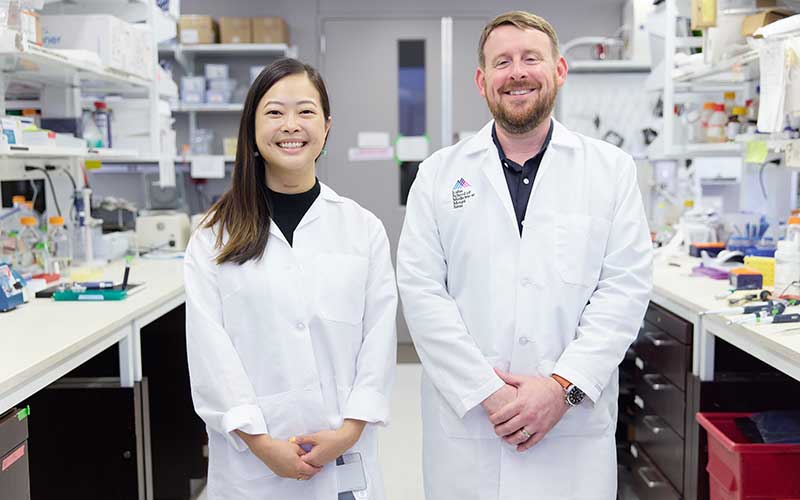Eighth Annual Mount Sinai Innovation Awards

Erik Lium, PhD, Executive Vice President, Mount Sinai Innovation Partners, left, presents the Mount Sinai Inventor of the Year Award to Steven J. Burakoff, MD.
Individuals and teams from the Mount Sinai Health System were honored for significant advances in biomedical research, technology, and medicine at the eighth annual Mount Sinai Innovation Awards ceremony held Monday, October 24.
Through the dedication of presenters, participants, attendees, and event organizers, the Innovation Awards showcase and inspire ingenuity and advances in research, technology, medicine, and health care.
Steven J. Burakoff, MD, Dean for Cancer Innovation and Lillian and Henry M. Stratton Professor of Cancer Medicine at the Icahn School of Medicine at Mount Sinai, received the Mount Sinai Inventor of the Year Award for developing small molecule therapeutic inhibitors targeting HPK1 to regulate the immune response against cancer. This technology entered phase 1 clinical trials in spring 2022. The award recognizes individual or collaborative investigators in the Mount Sinai Health System whose research is making, or has the potential to make, significant positive and product-driven impacts on health.
The Mount Sinai Transaction of the Year Award was given to Manish Arora, PhD, BDS, MPH, Professor and Vice Chairman; Christine Austin, PhD, Associate Professor; and Paul Curtin, PhD, Associate Professor, all at the Department of Environmental Medicine and Public Health. They are co-founders of Linus Biotechnology, which aims to develop and commercialize a novel precision exposome sequencing platform for complex diseases. The company received Breakthrough Device designation from the U.S. Food and Drug Administration for StrandDx™-ASD, a diagnostic aid for autism spectrum disorder. The award recognizes a notable technology from the Mount Sinai Health System that represents a major breakthrough in research and a strong commercial partnership for advancement,
The Lifetime Achievement Award was given to Robert J. Desnick, MD, PhD, Chair Emeritus and Professor, Genetics and Genomic Sciences, whose research led to the development of Fabrazyme® and GIVLAARI®, drugs for treating lysosomal storage disease. He co-founded Amicus Therapeutics, a company that aims to develop and deliver medicines for rare metabolic conditions, including olipudase alfa.

Scott Friedman, MD, Dean for Therapeutic Discovery, served as host of the event.
The Mount Sinai Pitch Challenge Award was given to Tyree Williams, MEng, a biomedical engineering doctoral researcher at Rensselaer Polytechnic Institute and a visiting graduate student researcher at Sinai BioDesign. He is the founder of Kratos Orthopedics, which is developing a novel mortar bone cement system to improve mechanical responses and post-operative care in patients who have undergone spinal surgeries. The award is the capstone event for Mount Sinai Innovation Partner’s Entrepreneurship Program, where finalists compete for a cash prize and pro-bono services to continue the development of health care solutions.
The Faculty Idea Prize was given to Sairam Geethanath, PhD, Assistant Professor, Diagnostic, Molecular and Interventional Radiology, and Shilpa R. Taufique, PhD, Assistant Professor, Psychiatry, for their work on substance use disorders, which affect brain health, especially in underserved populations, due to inequitable health care access. The award aims to support a collaborative, innovative, research idea by junior faculty that can potentially be translated into a marketable product through the development of therapeutics, devices, diagnostics, digital health applications, and/or data driven educational or community-based interventions.
The KiiLN Postdoctoral Entrepreneurship Award was given to Joon Ho Seo, PhD, a postdoctoral fellow, and SmartMazes, LLC. This project is focused on designing and manufacturing economical, modular, and modifiable rodent behavioral apparatuses that can serve as multiple mazes for the purpose of basic and translational neuroscience. The award is designed to highlight entrepreneurial endeavors of Mount Sinai postdoctoral fellows who co-found or lead companies by advancing their discoveries beyond the bench to create diagnostics, devices, and therapeutic products or by applying other solutions, in order to address unmet needs in life sciences.
The i3 Prism Award was given to Benjamin Rodriguez, a medical student, and Maddison Archer and Emelie Lassen, PhD, both postdoctoral fellows. The Mount Sinai i3 Prism technology commercialization fund aims to bring new health care solutions to patients and society by advancing technologies from women and Black, indigenous and people of color (BIPOC) inventors closer to the marketplace.
The i3 Genesis Award aims to translate Mount Sinai discoveries in various health care fields with clear potential for commercialization and defined technology or data gaps that can be addressed with funding. It was given to six teams for 2022 and five teams for 2021. The 2022 recipients are:
- Daniela Sia, PhD, Anna Tocheva, PhD, Elliot Merritt, PhD, and Emily Bramel
- Isabella Morgan, Joshua Bederson, MD, Mitch Baldwin, and Benjamin Rapoport, MD
- Weijia Zhang, PhD, Stephen Ward, MD, Fasika Tedla, MD, Zhengzi Yi, MSc, and Caixia Xi, MSc
- Yulia Landa, PsyD, MS, and Rachel Jespersen, MSW
- Kara Bagot, MD, Angela Diaz, MD, and Anne Nucci, MD
- Margaret Brandwein, MD, and Mark Urken, MD
The 2021 recipients are:
- Alfred-Marc Iloreta, MD, Turner Baker, PhD, Alexis Bruhat, MEng, and Benjamin Rapoport, MD
- Jonathan DePierro, PhD, Laurel Morris, PhD, James Murrough, MD, PhD, Dennis Charney, MD, and Adriana Feder, MD
- Mark Rea, PhD, and Bridget Bradley
- Evren Azeloglu, PhD, Eric Lima, PhD, Alan Benvenisty, MD, Kirk Campbell, MD, and Jacob Wright
- Gautam Kamthan, MD, and Sean Ianchulev, MD

The winners who attended the event held in Davis Auditorium in the Leon and Norma Hess Center for Science and Medicine on the Icahn School of Medicine at Mount Sinai campus.
The Diversity Innovation Hub Innovator Prize was given to Tanvir Islam, founder and CEO of TYCA, who has been supporting the growth of local economies and accessibility of resources within communities.
The Diversity Innovation Hub Founders Award was given to Gil Addo, MBA, cofounder and CEO of RubiconMD, who has been transforming the delivery of digital health through making specialty consults more accessible to all populations.
The THRIVE Fellowship Award was given to these teams:
- Spinovations: Tyree Williams, MEng, Ian Odland, BS, Eugene Hrabarchuck, BA, Zaara Irshad, MHA, and Janvi Patel, BA (mentor: Tanvir Choudhri, MD). Spinovations is working on developing a new spinal screwdriver for more patient-centered, minimally invasive surgeries.
- ai: Faris Gulamali, BS (mentor: Neha Dangayach, MD). They are focusing on the problem of monitoring intracranial pressure.
- Metaphor: Hyomin Seo, BEng, and Brian Soong, BA (mentors: Towfique Raj, PhD, John Doucette, PhD, and Emma Benn, DrPH). Metaphor is working on an AI-based project to detect early signs of Alzheimer’s disease in the speech patterns of non-English speakers.
- SSI Detection: Jenny Chen, BS, Nasseef Quasim, MDc, Sushruta Iruvanti, BA, Vivian Utti, BS, and Vivek Prakash, MD. They are working on a system to detect early signs of surgical site infection following vascular surgery procedures, using a combination of clinical biomarkers and remote visualization/monitoring technologies.
The Trainee Innovation Idea Award was given to these individuals:
- MD and MD/PhD Students: Randal A. Serafini, MS, Justin J. Frere, BS, Venetia Zachariou, PhD, and Benjamin R. TenOever, PhD, for developing a pre-clinical hamster model of long COVID for enhanced therapeutic development.
- PhD Students: Pushkala Jayaraman, MS, Justin Kauffman, BS, and Girish Nadkarni, MD, MPH, for work on AI and electronic health records.
- Postdoctoral Fellows: Wontack Han, PhD, Ryan Walker, PhD, Jeremiah Faith, PhD, and Maia Kayal, PhD, for identifying gut microbiome metagenomic features to develop a clinical prediction tool for inflammatory bowel disease.
- House staff: Harry Anastos, MD, for utilizing the expression of immune checkpoint proteins in the peripheral blood of patients with elevated prostatic specific antigen (PSA) to predict the presence of prostate cancer.
The Mount Sinai Innovation Awards hosts are: The office of the Dean; Mount Sinai Innovation Partners; the Office of Faculty Development; the Office for Diversity and Inclusion; the Keystone for Incubating Innovation in Life Sciences Network (KiiLN); ConduITS-Institute for Translational Sciences; Sinai BioDesign; the Department of Medical Education; the Graduate School of Biomedical Sciences; the Graduate Medical Education Office; and the Office of Postdoctoral Affairs.








